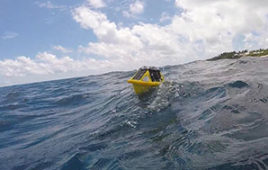VA Tech Dominates RoboCup, Captures 1st US Win
 |
| CHARLI-2 publicly debuted at the RoboCup 2011 competition in Istanbul, Turkey, and won the competition and main trophy of the event, the Louis Vuitton Humanoid Cup. CHARLI does not have hands yet. They are under development. |
Virginia Tech’s Robotics and Mechanisms Laboratory team participated in the international robot soccer competition known as RoboCup this past weekend, winning the Louis Vuitton Humanoid Cup, the competition’s version of the Fédération Internationale de Football Association’s World Cup.
The team also dominated with First Place in both the Adult Size class, with the five-foot humanoid robot CHARLI-2 (Cognitive Humanoid Autonomous Robot with Learning Intelligence), and the Kid Size class with the miniature-humanoid-robot DARwIn-OP (Dynamic Anthropomorphic Robot with Intelligence). The win is not just a first for the College of Engineering team headed by Dennis Hong, associate professor of mechanical engineering, but a first for the United States.
“Considered as the most prestigious award for humanoid robots, the Louis Vuitton Humanoid Cup is a beautiful crystal trophy and will be coming to the United States for the very first time,” Hong said via e-mail from Istanbul, Turkey, where the RoboCup 20011 Tournament was hosted. “Since 2002, it has been in Japan for seven years, then Germany took it and had it for two years, and finally the United States — Team CHARLI from Virginia Tech — brings it home.”
In all, Virginia Tech’s team took home four major awards from the international competition that is considered one of the most respected competitions in the robotics research community, and proposes a soccer match between full-size humanoid robots against the human World Cup human champions — and win — by the year 2050. Awards won include
• Best Humanoid Award, Louis Vuitton Humanoid Cup
• First Place, Adult Size class
• Third Place, Technical Challenges for TEAM CHARLI
• First Place, Kid Size Class for TEAM DARwIn
CHARLI 2 is the second in a series of adult-sized, autonomous humanoid robots built at Virginia Tech. The first version, known as CHARLI-L (the “L” is for lightweight) debuted in spring 2010, and made national headlines, appearing on the cover of Popular Science and in Robot magazines. Both generations were designed and built by doctoral student Jeakweon Han, a native of Korea now living in Blacksburg. It is Han who can be seen in YouTube videos on the Internet, standing behind CHARLI 2 as he takes the soccer court, scoring against various competitors.
“Today is such a big day. CHARLI won the final game and will bring Louis Vuitton Cup to Virginia Tech as the best humanoid,” said Han on his Facebook page, shortly after CHARLI won the final game in its division.
In the Kid Size Class, Team DARwIn beat several teams, including a team from Japan for the championship. Joining Virginia Tech’s Robotics and Mechanisms Laboratory was a team of engineering students from the University of Pennsylvania, who are collaborating with Hong’s group on RoboCup competitions involving the Kid Class humanoid robots and the development of DARwIn-OP.
Under director and founder Hong, the Robotics and Mechanisms Laboratory started project DARwIn in 2003 to study human locomotion and humanoid robot design. DARwIn-1 was introduced in 2004 and was a revolutionary humanoid robot prototype at the time, followed by several incarnations since. DARwIn-OP was introduced this past year and is a fully open source design — both software and hardware. All info on the hardware is to be shared on-line for free, including detailed plans and drawings, manuals for fabrication and assembly.
The Robotics and Mechanisms Laboratory will retain the Louis Vuitton Humanoid Cup until July 2012, when the next tournament kicks off.




